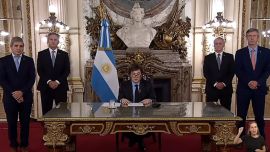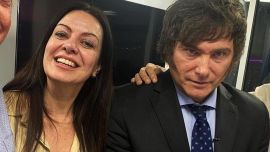Spending most of last week on a grand tour taking in all the major European capitals save Brexit London, President Alberto Fernández obtained generic support for debt renegotiation without anybody going as far as to underwrite his maximal aspiration of a total reprieve during his presidency.
But Fernández came to Europe seeking support for the renegotiation of not only Argentina’s foreign debt but also the European Union-Mercosur free trade agreement. Here the reaction of his hosts was mixed between frustration over the prospect of having to start the 16 years of laborious negotiations needed to reach last year’s agreement all over again and relief that the resistance to the agreement being registered by some EU members (including his last stop in Paris) is being echoed on the South American side.
Fernández began February where he ended January with his Vatican meeting with Pope Francis – in Rome. But it was no idle weekend – he met up with Qu Dongyu, the new Chinese director-general of the Food and Agriculture Organisation (a United Nations agency with its headquarters in Rome), to sound out international assistance for his plan against hunger. Yet he spent most of his time preparing the ground both for the coming week’s meetings and Economy Minister Martín Guzmán’s Wednesday presentation at a Vatican debt seminar.
Following the Roman weekend, the week began in Berlin where both Fernández and Guzmán were received for almost two hours (including dinner) on Monday evening by veteran German Chancellor Angela Merkel. Here their request for easier debt conditions was accompanied by a pledge to fiscal discipline to impress the conservative politician as to their will to repay.
Merkel promised German support within the International Monetary Fund for Argentina’s debt to the IMF at least being postponed until 2024 (i.e. during the current presidency), pronouncing the request “reasonable” according to Fernández (although there was no official German comment on that point). The four European countries visited in the past week account for around 15 percent of the votes on the IMF board of directors.
Fernández obtained less joy with his other renegotiation proposal – as head of an export superpower (with a trade surplusof some US$ 1.3 billion in Argentina’s case), Merkel is keen to see the EU-Mercosur agreement go ahead.
“You’re asking me to tango when I’m in intensive therapy,” commented Fernández.
But Merkel did not want to lim it t he conver sat ion to Argentina’s debt problems or the EU-Mercosur agreement, asking why Argentina is taking so long to pay the German construction company Hochtief the money awarded by the arbitration of the International Centre for Settlement of Investment Disputes (CIADI in its Spanish acronym) back in 2016 or why the Chihuido hydro-electric dam project, where Germany’s Voith is a consortium partner, is being held up. Fernández has said that Argentina will pay Hochtief the US$ 13 million awarded by CIASI if the company withdraws its claim for total damages of US$ 157 million.
Merkel also asked about the spate of social upheavals recently sweeping South America with Fernández replying that only the result of last October’s elections had saved Argentina from a similar fate. When asked about Chinese commercial expansion in the region, Fernández said that other countries were perfectly welcome to invest, offering himself as a gateway for German investments in Latin America.
The evening ended with Merkel expressing curiosity about Peronism and Fernández assuring her that the movement was more pragmatic than populist.
Although cold and rainy weather restricted his Berlin activities, Fernández also touched base with the German business world. Monday started with a working breakfast in his hotel with businessmen from several top firms (Allianz, Wintershall, Bayer, BASF, SAP, Deutsche Bahn, Hamburg Süd, Merck, Siemens, Mercedes Benz, ThyssenKrupp, Voith, Lindal, Grupo Hydro, etc.) before paying a noon visit to Volkswagen, who confirmed plans to invest US$ 800 million in a new model at its General Pacheco plant but also requested tax breaks. One common anxiety was the impossibility of repatriating profits but Fernández promised flexibility, especially for those investing in Vaca Muerta shale (where Wintershall already has a stake).
Tuesday saw Fernández already in Spain where the Argentine president was granted a royal audience with King Felipe VI and talked with socialist premier Pedro Sánchez, the European leader whom Fernández views as the most progressive on this tour and thus the one with whom he has the most empathy. Fernández chose this visit to time confirmation of the 2011 Radical presidential candidate Ricardo Alfonsín as his future ambassador in Madrid.
Too much at home in Spain to press any point there, Fernández returned to his two main objectives in Paris – the renegotiation of Argentina’s foreign debt and the EU-Mercosuragreement. On the latter issue, while French farmers spearhead European resistance to the agreement, French President Emmanuel Macron sees little point in renegotiation – he views the agreement as a take-it-orleave-it proposition. In any case Macron had other things on his mind with the backlash against his pension reforms.
But Macron gave Fernández ample satisfaction on the debt front, saying: “France will help Argentina with the IMF to return to growth and a sustainable debt.” Fernández also suggested that France use the Brexit negotiations in the rest of the year to press London to start dialogue over Malvinas sovereignty. The Wednesday encounter was generally cordial with Fernández even strumming a guitar at one point.
As in Berlin, Fernández held a working breakfast for businessmen with executives from 39 leading French companies (including L’Oréal, Total, Michelin, Alstom, Air France and Thales) accepting the invitation and as on Monday, the main anxiety expressed was the barriers to repatriating dividends alongside the paralysis of public works. Fernández blamed his predecessor Mauricio Macri for the difficulties. The president also found time to look up the French economist Thomas Piketty to hear his critique of capitalism and inequality.
On Thursday morning Fernández concluded his tour with an important meeting with Christel Bories, the CEO of Eramet, a mining company interested in Jujuy’s lithium. This meeting was preceded by an encounter with Argentine human rights activists resident in Paris.
The European tour generally
received a favourable press.
Fernández himself concluded:
“The agreement with the IMF is
now closer” although he was
asked more than once about his
economic plan to accompany
the renegotiation, considered
essential by economic experts.
For an independent verdict,
analyst Andrei Serbin Point
sums up: “He was able to showcase himself with important
global leaders. It was successful
in the terms that there wasn’t
anything unexpected. Good
first sign”. related news




















Comments